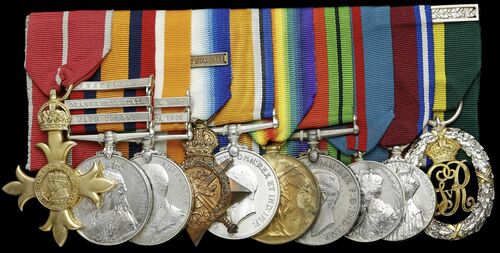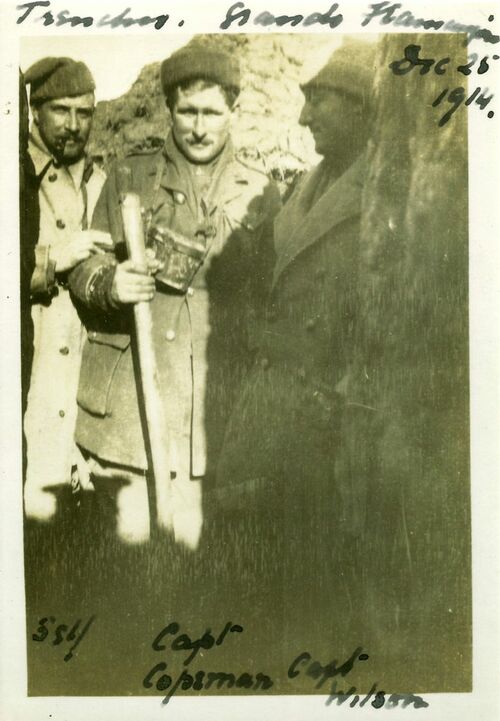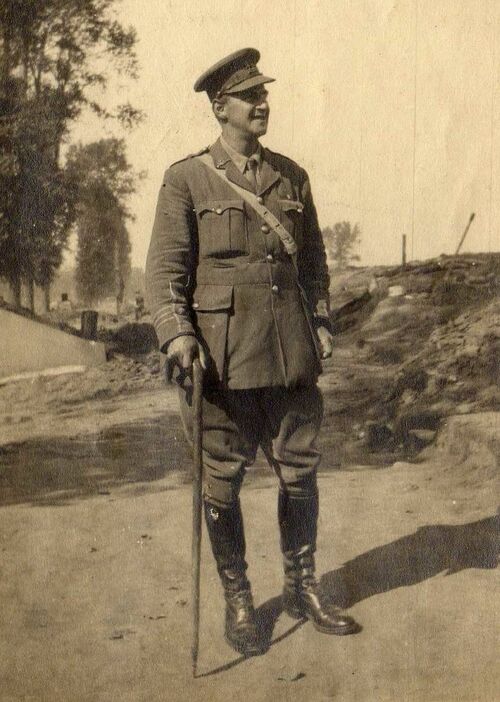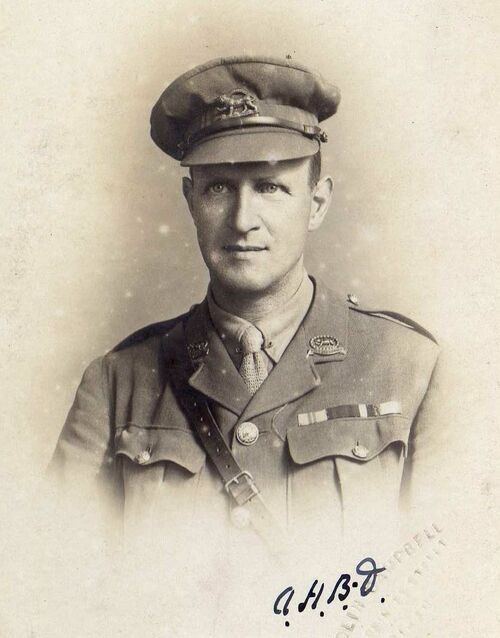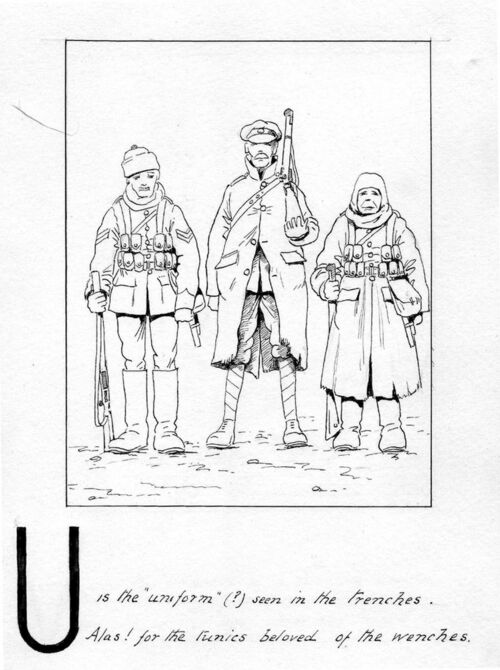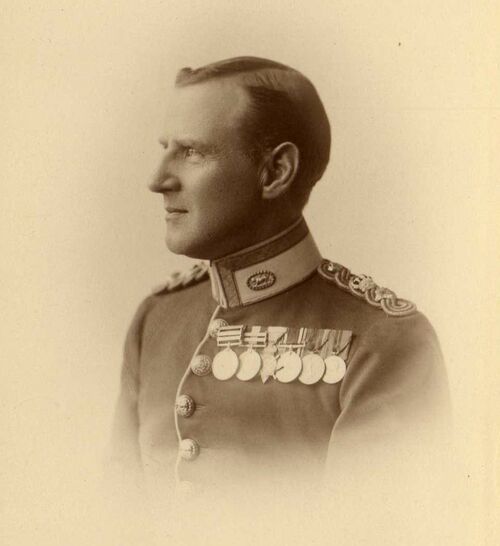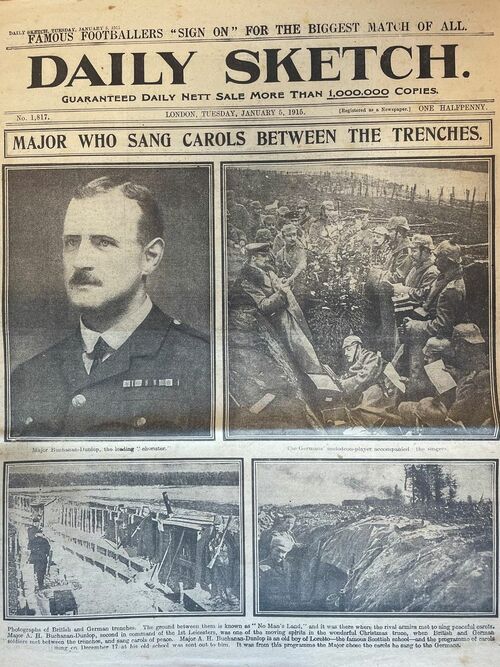Auction: 23002 - Orders, Decorations and Medals
Lot: 100
(x) 'Even out here this is a time of peace & goodwill. I’ve just spent an hour talking to the German officers & men who have drawn a line halfway between our left trenches & theirs & have all met our men and officers there.
We exchanged cigars, cigarettes, & papers. They are jolly, cheery fellows for the most part, & it seems so silly under the circumstances to be fighting them. Firing has practically stopped, and it’s only when our men start repairing wire entanglements that they send along some warning shots.
Last night a select band of officers & men sang carols to them, & they did ditto. That Loretto concert programme, with the words of the carols, was most useful to us. I got it, & your letters in 3 days, which is a record...there is a hard frost, & everything is white & Christmassy, but cold, which personally I like...I’m going to try & have a service for men off duty this afternoon & as there is a post out this afternoon, I shall be busy censoring letters, so can’t write you a long one today.'
So wrote Captain Buchanan-Dunlop to his wife on 25 December 1914; he had just initiated the Christmas Truce.
The historically important Home Guard O.B.E. group of ten awarded to Lieutenant-Colonel H. A. Buchanan-Dunlop, 16th Laird of Drumhead, Leicestershire Regiment, Royal Scots, Royal Berkshire Regiment and Edinburgh Home Guard
Buchanan-Dunlop carved his name into the history of the Great War for his work initiating and being the 'Leading Chorister' during the famous Christmas Truce of 1914 when the guns fell silent in No Man's Land
The Most Excellent Order of the British Empire, 2nd Type, Military Division (O.B.E.) Officer's breast Badge, silver-gilt; Queen's South Africa 1899-1902, 3 clasps, Cape Colony, Orange Free State, Transvaal (Lieut. A. H. Buchanan-Dunlop. 2/Rl. Berks. Rgt.); King's South Africa 1901-02, 2 clasps, South Africa 1901, South Africa 1902 (Lt. A. H. Buchanan Dunlop. R. Berk. Rgt.); 1914 Star, clasp (Capt: A. H. Buchanan-Dunlop. Leic: R.); British War and Victory Medals (Lt. Col. A. H. Buchanan-Dunlop.); Defence Medal 1939-45; Coronation 1911; Jubilee 1935; Territorial Officer's Decoration, G.V.R., silver-gilt and silver, with top riband bar, this adapted for wear, mounted court-style for wear by Spink & Son, traces of lacquer, very fine (10)
Provenance:
Christies, July 1990.
A fine career biography was published by the Grand Lodge of Scotland in 2018:
'The Edinburgh Evening News carried the following headline:-
"LORETTO PUPIL WHO STOPPED THE WAR"
This Loretto pupil was none other than Lieutenant Colonel Archibald Henry Buchanan-Dunlop, O.B.E., a distinguished brother and Past Master of both Lodge St. John, No. 112, and The Loretto Centenary Lodge, No. 1373.
Lieutenant Colonel Archibald Henry Buchanan-Dunlop was educated at Loretto School and at Sandhurst Military College. After passing out as a junior officer, he was assigned to the Royal Berkshire Regiment. He served two years on active service in the South African War, during which he won both the Queen's and King's Medals. It was while serving in South Africa that Lt. Col. Buchanan-Dunlop began his Masonic Career. He was Initiated, Passed and Raised in Lodge Rising Star, No. 1022, English Constitution.
After serving fifteen years in the Army, he retired and returned to Loretto School aged thirty four years. His first job at the school was as an art teacher. The school had by this time started an "Officer Training Corps". It was a natural progression for Lt. Col. Buchanan-Dunlop to take over the organisation of this new venture within the school.
On the outbreak of the 1st World War, he found himself back in uniform. He was appointed Major, 2nd-in-command of the Leicestershire Regiment and was soon back in active service in Ypres in Belgium where the above remarkable truce on Christmas Day 1914 took place. The Colonel, accompanied by his men, wandered into "No-Man’s Land" and met with the enemy. They spent over an hour conversing with the German officers and men. This was confirmed in letters that he wrote to his wife who, in turn, would send copies of the Gospel of St. John for the Colonel to read to his troops in their darkest hour. The two armies met face to face, they exchanged cigarettes, etc. and then proceeded to conduct a carol service which had been prepared for the pupils of Loretto for Christmas 1913. A game of football followed before the men returned to the trenches.
As we now know the truce was not welcomed or approved of by the British High Command, who issued Orders banning any other such action. The Colonel found himself in serious trouble with his superiors for the major part he had played in the truce. However, this event made international headlines across the world, the Daily Sketch, published in London, quoted the Colonel as "One of the Moving Spirits in this Wonderful Xmas Truce".
The Colonel was instrumental in setting up Talbot House behind the front line, a club used by officers and enlisted men alike for rest and respite after having been at the front for a certain length of time. These clubs were originally for officers only.
Within the last ten years. Loretto School has been twinned with "The Heilige Families School" at Ypres. Just before Christmas 1998, the two schools met at Ypres and unveiled a Peace Bell dedicated to Lieutenant Colonel Archibald Henry Buchanan-Dunlop and the German Officer-in-charge, Johannes Nieman, who helped organise the truce.
Major Buchanan-Dunlop (it must be remembered that during this period of service he was a Major) was on the strength of the 1st Battalion of the Leicester Regiment. The Battalion had been involved in the fighting around Armentieres and Rue de Bois. On 31st May 1915, his Battalion moved into the line at Ypres Salient and it continued the Salient until the end of July, 1916. On 22nd October 1915, the Commanding Officer, Lt. Col. Stoney was killed by a sniper and Major Buchanan-Dunlop temporarily took command. It was reported that Lt. Col. Gillespie took command on 15th September, 1916. Sometime during this action Major Buchanan-Dunlop suffered injury during a gas attack and, after convalescence, he was invalided out of the Army in 1916.
Despite being invalided out of active service, Lt. Col. Buchanan-Dunlop still maintained an active part in military matters. He became Commanding Officer of the 3rd (Vol) Battalion, The Royal Scots.
On returning to civilian life after his discharge, the Colonel returned to Loretto to take up his duties, that of Art and Sports Master as well as Officer Commanding the Officer Training Corps. He became the school's first Bursar. He compiled the school's "Roll of Honour", which was published in 1924. Out of six hundred and twenty eight former pupils, one hundred and forty seven lost their lives fighting for their country during the 1914-1918 World War.
The school held Colonel Buchanan-Dunlop in high esteem. He was always up to something. His dress was always immaculate with tweed suit, plus fours, monocle and his very large hand carved pipe sitting on his chin. He wrote and produced plays for the school. He would organise the props; he would even do the make-up. He would often get up on the stage and entertain the pupils with funny songs. He also put on small art exhibitions of the pupils' work.
The Colonel was an all-round sportsman. excelling in fencing, shooting, cricket, golf and rugby. He played rugby to a good standard as he represented the Berkshire Regiment, the Berkshire Wanderers and the Orange River Colony. He represented the British Army at golf. He also excelled in "Swedish Drill", a fast form of gymnastics.
He represented Lodge St. John, No. 112, many times in the annual golf matches with Lodge Canongate Kilwinning, No. 2, as well as at many Provincial golf tournaments. He was Captain of the Royal Musselburgh Golf Club in the years 1919-1920. He also became a Musselburgh Town Councillor the same year.
HE WAS A TRULY REMARKABLE MAN
Lieutenant Colonel Buchanan-Dunlop affiliated to Lodge St. John Fisherrow No. 112 in 1920. He first took office in 1924 as Standard Bearer. He missed the Installation Ceremony in December 1923. but he presented the Lodge with a Standard Bearer's Jewel on 20th February 1924 and the Right Worshipful Master. Bro Richard Shields, thanked him on behalf of the Lodge and proceeded to invest him with the Jewel he had just presented to the Lodge. He was installed as Right Worshipful Master of the Lodge on 21st December 1927 and re-installed on 19th December 1928. On his re-installation, the Lodge was reduced to the 1st Degree when the Colonel initiated two of his sons in Freemasonry. Afterwards the Lodge continued with the Installation Ceremony and his sons then witnessed their father being installed into the Chair. Before vacating the Chair, the Colonel initiated his third son into the Craft. His three sons were Robert Arthur, Archibald Ian and David Kenny Buchanan-Dunlop. As 1.P.M., the Colonel was given the Gavel to raise his third son, David, to the 3rd or Master Mason Degree, thereby allowing the Colonel to have the honour of Initiating, Passing and Raising his three sons into the Craft.
The Colonel was a Founder Member of The Loretto Centenary Lodge No. 1373, which was chartered on November 6th 1930. He was Secretary for two years and was then installed as Right Worshipful Master in December 1931, a position he held for the next four years. Six years as a Master over a nine year period; A Truly Remarkable Man!
The Colonel's Founder Member's Jewel, his Past Master's Apron and the Lodge Immediate Past Master's Jewel are held in the Loretto School library. His Past Master's Jewel from Lodge St. John No. 112 is proudly worn today by Past Master Brother David Donaldson.
The final chapter of this story is very pleasing to relate. When Brother Bobby Law was installed as Right Worshipful Master on 23rd December 1944, one of his first duties was to inform the Brethren that Lieutenant Colonel Buchanan-Dunlop was to receive the high honour of the Order of the British Empire at the hand of King George VI at the Palace of Holyrood House. Sadly, the Colonel passed to the Grand Lodge Above in 1947, aged seventy three years.'
The Christmas Truce 1914
Plenty of ink has been spilled over the years in recalling the famed Christmas Truce of 1914. The official accounts will tell you no such event happened and the C.W.G.C. records that no less than 148 individuals lost their lives on Christmas Day 1914. Nonetheless the Christian spirit led to a series of unofficial ceasefires and meetings between those who found themselves facing one another across the trenches of the Western Front. From 24-26 December, some sang with one another, some played football, exchanged prisoners or buried comrades. One of the key players in the sector from Rue du Bois to La Grande Flamengerie was Captain Buchanan-Dunlop. A veteran of the Boer War, he was serving with the Leicestershire Regiment and was probably facing the German 107th, 139th and 179th Infantry Regiments, all of whom hailed from Saxony. He had gone up to the front line on 22 November 1914 and wrote home:
'Last night, marching up here (you have to come up at night or you get picked off) I had a narrow shave, the enemy, who are only a couple of yards from our trenches, fired, presumably at the sound of our marching, & just missed my head. The bullet went into the bank behind me.
Captain Tidswell, the Adjutant, came up to the farm we were in, as I was writing to you; & told me that the Colonel wanted me in the trenches at once to take command of one of the Companies, so I am now snugly ensconced in the firing line, writing to you by the light of a candle...tell Og I am a Major, not a Captain. – in the Leicestershire Regt.'
On 25 November:
'The Colonel is very cheery & jolly & we are all very well. The food is excellent & plentiful, but is all brought in of course, at night. No rest of course from bullets, but nobody minds them. Dear little wife, don’t you worry a bit about me. I’m happy & well, & quite enjoying it as long as my Company is all right (& we’ve had no one in the company hit for a long time) I’m very careful & insist on my officers & men being the same. If it’s one’s duty to take a risk, why you take it; but if it’s not necessary, I consider it wrong not to be as cautious as possible. I don’t mind how much I rough it; it’s good for me & I feel really most awfully well.'
On 2 December:
'Secondly we have been reviewed this afternoon by The King!! Wasn’t it good of him to come out & buck us up. I’m so glad we happen to be one of the Regiments out of the trenches when he came. He was so nice & took notice of each officer. The Prince of Wales was with him. The King is looking older & more careworn, no wonder, poor man. Isn’t it sporting of him to come out?'
On 8 December:
'What wouldn’t I give just to spend Christmas day with you & our little boys...I shall miss the Carols in Chapel this year & the Christmas anthems. You don’t really know how fond you are of them till you’ve got to do without them.'
On 23 December:
'Last night was a jolly night, bright stars & no rain, & my trenches were getting quite clean, but this morning early, snow began to fall, & they are getting quite beastly again. However, now they have cleaned up a bit, & the snow has stopped, so if only we could get a little frost, we’d soon have them fairly passable.'
The letter of 25 December:
''Even out here this is a time of peace & goodwill. I’ve just spent an hour talking to the German officers & men who have drawn a line halfway between our left trenches & theirs & have all met our men and officers there.
We exchanged cigars, cigarettes, & papers. They are jolly, cheery fellows for the most part, & it seems so silly under the circumstances to be fighting them. Firing has practically stopped, and it’s only when our men start repairing wire entanglements that they send along some warning shots.
Last night a select band of officers & men sang carols to them, & they did ditto. That Loretto concert programme, with the words of the carols, was most useful to us. I got it, & your letters in 3 days, which is a record...there is a hard frost, & everything is white & Christmassy, but cold, which personally I like...I’m going to try & have a service for men off duty this afternoon & as there is a post out this afternoon, I shall be busy censoring letters, so can’t write you a long one today.'
On Boxing Day:
'I must begin a letter to you tonight. I’ve had quite a cheery Boxing Day: Hard frost & bright snow. I had some cake & a glass of Madeira & a chat, with the Colonel this morning; & Buggins asked me to lunch with him, as he had had a turkey! sent him & mince pies. He lives a good way behind us, as he is in Reserve with his Company. I had a tremendous lunch & was half comatose in a chair by his fire (unheard of luxuries when Colin suddenly came in.) I was glad to see him. It appears that he is about 5 miles or more to our right, & having a day off – for the Wurtembergers in front of him had agreed to an informal suspension of hostilities – had set out to find me, not knowing my Brigade. How he managed it I can’t think, but he found my dug-out and was re-directed to A company. He was so cheery, & looking very fit & well & awfully clean & neat. How he managed it that, too, I can’t think. He was much struck by my appearance I think, & no wonder, for I was in a waterproof, mostly clay, & had my Balacklava helmet on with a bit of Jean’s holly in it, & my moustache & beard are not tidy, & I’m not clean. He stayed about half an hour with us. I’m so glad we have found each other at last.
Then this morning I got my Christmas Box from Princess Mary – a card, a pipe, & an embossed box in plain metal with tobacco and cigarettes in it – lastly & most important I got two letters & a letter-card from you, dated Nov. 10 – Dec 21 – Dec 23. The first had been to the Royal Warwicks why I don’t know. So you see my darling I’ve had quite a jolly day. – The enemy on our left – Saxons – are still out hobnobbing with our fellows, but the folk opposite us – Prussians – are very vicious indeed. It has begun to snow now – horror! I shall send you my Christmas cards from the King & Queen & Princess Mary – you might get little frames for them my sweetheart.
I managed a little Christmas service for my company yesterday. I had to have three, one on the right, then move to the centre, then one on the left. I just had a few prayers, read them the Christmas story from St Luke, & had some hymns. Mother sent me a lot of St John’s gospels for the pocket, & they have hymns at the end. Please tell her how useful they have been and how much the men liked it. The General happened to come round just as the last one was going on, & said it was awfully nice. He had come down rather angry over the informal cessation of hostilities but seemed to be quite soothed by the hymns. You’re not forgetting a prayer book are you my darling – I do feel so sorry for my men, only two in the Company of 230 ever read a Bible, & no chaplain comes near the trenches. They never are reminded by anyone of God or the hereafter, & I feel it a duty to have a service on Sundays, now that I have “broken the ice” & found out that they will come. It is a feeble effort, but still something that one can do for Him who has given us so much.'
Letters followed in the days and months that passed and his part clearly captured the attention of the authorities. Details of his exploits featured in several newspapers but it was to be his image and description of his work as the '...leading chorister' on the front cover of the Daily Sketch of 5 January 1915 that cemented his place in history. The caption read:
'Photographs of British and German trenches. The ground between them is known as “No Man’s Land,” and it was there where the rival armies met to sing peaceful carols. Major A. H. Buchanan-Dunlop, second in command of the 1st Leicesters, was one of the moving spirits in the wonderful Christmas truce, when British and German soldiers met between the trenches, and sang carols of peace. Major A. H. Buchanan-Dunlop is an old boy of Loretto – the famous Scottish school – and the programme of carols sung on December 17 at his old school was sent out to him. It was from this programme the Major chose the carols he sang to the Germans.'
Sold together with copied research.
Subject to 5% tax on Hammer Price in addition to 20% VAT on Buyer’s Premium.
Sold for
£8,000
Starting price
£1900

